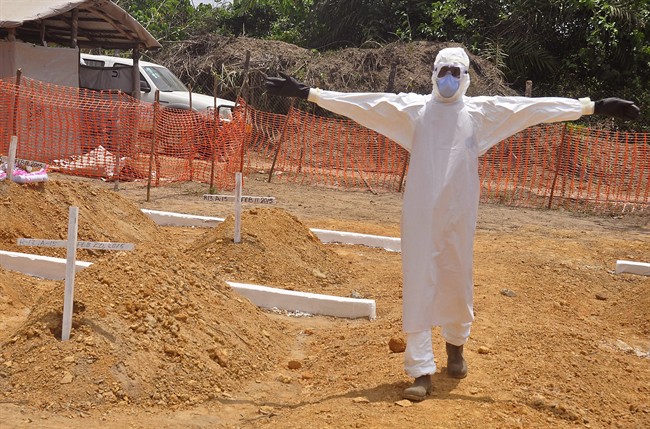Earlier this year, scientists warned that Ebola was mutating, potentially leaving some experimental treatments useless. Now the latest findings reveal that while its makeup has changed, the virus that’s made its way through West Africa hasn’t become deadlier since the first outbreak 40 years ago.

Ebola has killed more than 10,000 people since the outbreak began in 2013 – mostly in Liberia, Sierra Leone and Guinea – but British researchers out of the University of Manchester say that genetic changes haven’t made the virus more virulent.
“The fact that Ebola isn’t changing in a way that affects the virulence of the disease means that vaccines and treatments developed during this current outbreak have a very high chance of being effective against future outbreaks,” Dr. David Robertson said.
READ MORE: Ebola is mutating, experimental drugs may not work, study suggests
“It also means that methods to successfully tackle the virus should work again, so hopefully in the future an outbreak can be stopped from spreading at a much earlier stage.”
Robertson and his team studied the genetic changes to Ebola in real time as the outbreak raged on.
All viruses mutate. Just think of this year’s flu season, in which H3N2 was the main culprit of sickness in the Southern Hemisphere and Northern Hemisphere. While health officials prepared for a vaccine with the H3N2 virus, by the time it made its way to the Northern Hemisphere, it “drifted” and no longer matched the strain in the flu vaccine.
READ MORE: How does Ebola spread? 5 things you need to know
Last month, American researchers tracking the deadly virus say they discovered changes in the strain – and these mutations could get in the way of effectiveness of experimental drugs that made progress so far.
This time around, the researchers pored over data from every Ebola outbreak since 1976 to mark changes made in the virus. They even predicted the consequences each time the virus drifted.
READ MORE: 5 things to know about Canada’s experimental Ebola vaccine
“What we found was that whilst Ebola is mutating, it isn’t evolving the point of adapting to become more or less virulent. The function of the virus has remained the same over the past four decades which really surprised us,” Dr. Simon Lovell said.
“Unfortunately, this does mean the Ebola virus that has now emerged on several occasions since the 1970s will very probably do so again,” he explained.
There is good news, though: the scientists say that the treatments in the works now have a “very high chance” of being effective against outbreaks down the road, too. Ideally, a future outbreak would be stopped in its tracks before spreading as much as it did this time around.
READ MORE: Worried about Ebola? 5 answers to your questions
The latest findings were published Monday night in the journal Virology. Read the full findings here.
carmen.chai@globalnews.ca
Follow @Carmen_Chai




Comments